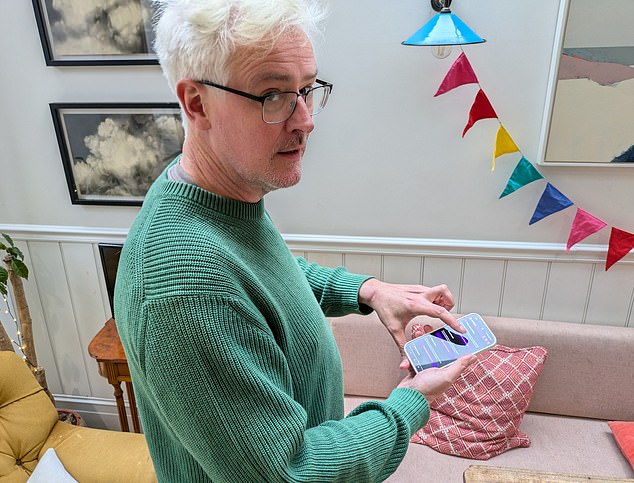I trained myself to control my dreams… I’m ashamed to admit what I did in them
For the past few days, my phone has been sending me notifications to remind me that I’m awake and not dreaming.
That’s because I’ve recently trained myself to become a ‘lucid dreamer’ – and just like in the plot of the movie Inception, the app’s makers worry that I’ll become so efficient at it that I can no longer distinguish between the two states of consciousness.
I started using the app Awoken after hearing about research that lucid dreaming has cognitive benefits, such as self-awareness.
Simply put, a lucid dream is a type of dream where the person is aware that they are dreaming.
It allows people to experience a state of ‘heightened awareness’ during sleep and allows them to control what is happening in the dream.
Awoken combines daytime training with nighttime sensory cues that woke me up with a gentle chime sound so I could record what I was experiencing during my sleep.
It all seemed somewhat ridiculous until about the fourth night I had my first lucid dream.
I’m ashamed to admit it was about Dungeons and Dragons, which I had played with some old friends earlier in the evening.
In the lucid dream I discovered a powerful character and went to battle in sunlit ruins, where I was 100 percent aware that I was actually sleeping.
Lucid dreams are dreams in which the dreamer is aware that he is dreaming and can sometimes control what is happening
I would have liked to report that I had gained full control and was able to fly through the air, but beyond the concrete certainty that I was dreaming, I was unable to direct the dream in any direction.
But when I woke up, I felt absolutely elated at the “Knight” character I had become, as I brandished my sword and attacked enemies on the battlefield.
The entire scene felt like a realistic adventure, allowing me to control how fast I ran, how hard I swayed, and which direction I moved through the ruins.
Lucid dreams are relatively common: up to 55 percent of people have experienced them at least once in their lives.
Why would you want to have a lucid dream? Well, besides the fact that it’s just cool to control your dreams, it’s been shown to have several benefits.
According to its growing group of exponents, lucid dreaming not only has the power to improve health – both mental and physical – but also help us process past traumas, overcome phobias and addictive behaviors, and even improve life skills.
Advocates have also suggested that controlling dreams may be a way to cope with real-life trauma – or even a way to improve skills.
But can an app really make you dream differently?
According to experts, there are several well-known techniques for achieving lucidity, and most lucid dreaming apps follow at least some of these techniques.
Dr. Chelsea Perry, a diplomate of the American Board of Dental Sleep Medicine and owner of Sleep Solutions, told DailyMail.com: ‘Achieving lucid dreaming takes practice, but some simple techniques can make it easier.

For the past few days my phone has been sending me notifications all day long to remind me that I’m awake and not dreaming (Rob Waugh)
‘An effective method is to start with reality checks, by regularly asking yourself: ‘Am I dreaming?’ during the day.
“This question can carry over into your dreams, helping you recognize when you’re actually in them.”
This is how Awoken works: you are reminded all day long that you are in reality, and when you wake up you try to remember your dreams.
‘Keeping a dream diary next to your bed also increases awareness. Writing down your dreams immediately after waking “sharpens the memory and helps you notice patterns or ‘dream signs’ that often show up in dreams,” says Dr. Perry.
‘Another approach, called Mnemonic Induction of Lucid Dreams (MILD), involves repeating a phrase like, ‘The next time I dream, I will recognize it’ before bed to set an intention for lucidity .
‘If you feel like experimenting, try the ‘Wake Back to Bed’ (WBTB) method by setting an alarm to wake up after about five hours of sleep, stay awake for a while and then go back to sleep with clarity in mind.
Research by Northwestern University in October 2024 suggested that smartphone apps can make you truly lucid dream through targeted lucidity reactivation (TLR) – combining pre-sleep training with sensory cues during sleep.
‘Apps can be useful tools. While they don’t directly induce lucid dreams, they aid the process by providing reminders for reality checks, a place to log your dreams, and audio cues to increase awareness,” said Dr. Perry.
‘These features provide structure and guidance, making it easier to stick to a consistent practice.’
